John Janaro's Blog, page 15
February 12, 2025
World Day of the Sick 2025
In conjunction with the feast of Our Lady of Lourdes, February 11 is the “World Day of the Sick,” an observance that has meant much to me and countless other people through the years. This year’s message from the Pope was summarized and rendered in graphic form by the Roman Dicastery for Integral Human Development.
The formatting is interesting, if perhaps a bit “cluttered” (not that I could have done it any better). I appreciate it as a media technique for our more image-dominated (and perhaps less patient) digital world, and—or course—for the content of the message itself. Tap the image to enlarge it (the print is small).

February 11, 2025
Lourdes: Mary and the Tenderness of God
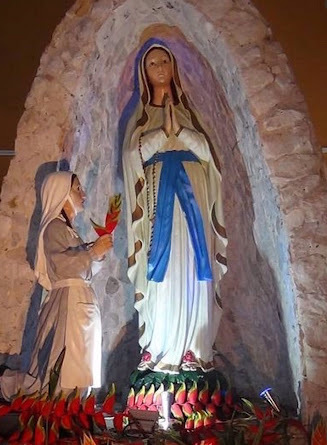 These are a few words from the Servant of God Luigi Giussani during a pilgrimage to Lourdes with the Fraternity of Communion and Liberation in 1992:
These are a few words from the Servant of God Luigi Giussani during a pilgrimage to Lourdes with the Fraternity of Communion and Liberation in 1992:"Mary is the answer created in history to the fact that our nature is desire for happiness, that our life is desire for truth. Mary conceived in her womb the mystery of God made flesh, made man to live the life of all people and end His life the way all human lives end: with death. Incarnating Himself in Mary, God says: 'I will bring to fulfillment your desire for happiness; your desire for truth, justice and completeness will come to completion. I will make Myself your companion so this may come to pass.'
"The Lord, becoming man in Our Lady’s womb, coming into the world to save the world, underlines that the original relationship of the Mystery with His creature, whatever the condition in which life must be lived, is tenderness. 'No one has greater love than this, to lay down one’s life for one’s friends' (John 15:13); there is no greater sacrifice than to lay down your life for the work of another, and the other, in this case, is each of us as realization of our own destiny.
"God’s tenderness brings with it the announcement of the positivity of all things: 'Even all the hairs of your head are counted'" (Matthew 10:30).
February 10, 2025
Christina Grimmie Seems So Long Ago...
 Eight years and eight months ago, Christina Grimmie passed away. Once again, this day, I remember her and honor her legacy.
Eight years and eight months ago, Christina Grimmie passed away. Once again, this day, I remember her and honor her legacy.We live in strange times. The particular and peculiar characteristics of our world in one sense don't appear so different now than they did on that awful summer night in June 2016. In other senses, however, the previous decade seems very long ago indeed. Many things appear to be changing rapidly, and we analyze and struggle and fight with one another over what these changes mean. We are overloaded with conflicting narratives, alleged information, and relentless images and sounds, but we don't seem to be growing in wisdom and understanding. Do we intend push forward recklessly into every technological possibility, driven by our urge for ever-greater power (and ever-greater profits)? Do we think we won’t be held accountable for the oppression and suffering of all the human persons we push aside as we plow over the world pursuing our inflamed ambitions?
The capacities of AI keep multiplying, but I find it more and more frustrating and complicated to work photographs into worthwhile artistic expressions. Media tools that are supposed to increase accessibility can just as easily lead to bewilderment. Maybe for me this is just part of growing old.
Still, my efforts are on a very basic scale. I can't imagine what implications the new technologies will have on the processes and organization of governments, though it appears that nations are plunging in headlong to the vast experiment. We think we see where we are going, but are we blind to our own blindness?
Christina Grimmie's risks in music and media took her in directions she never could have imagined, to earthly successes and to the unexpected circumstances that resulted in the tragic and violent end of her earthly life. But her efforts were shaped by the boldness of love for the One who created her, redeemed her, and called her to Himself.
She is a sign of what ultimately matters, what gives meaning to successes and failures, to strength and powerlessness, to hope for all of life that cries out for eternity.
February 9, 2025
Saint Josephine Bakhita Finds True Freedom
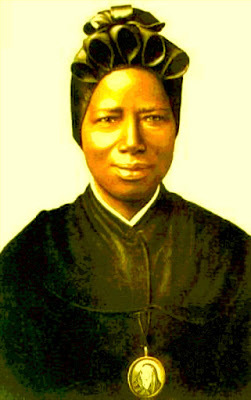 Yesterday we celebrated a woman who was empowered by the love of God, and who gives hope to all powerless women, abused women, trafficked women - to oppressed women and men throughout the world.
Yesterday we celebrated a woman who was empowered by the love of God, and who gives hope to all powerless women, abused women, trafficked women - to oppressed women and men throughout the world. She was abducted from her African village and native people of South Sudan in the latter half of the 19th century. She never remembered her birth name, but the Arab slave traders had called her "Bakhita," which means "lucky."
There was nothing that looked lucky about the horrible abuse and mutilation that she suffered for years as a slave in Northern Sudan, but then she was brought to Italy, found Christ, and was baptized Giuseppina Fortunata ("lucky"). She became a religious sister and for 40 years worked at the convent and among the people simply but with profound charity. She not only forgave her oppressors, but said she would kiss their hands if she saw them, because they brought her to Jesus.
Jesus overcame evil with good, hatred and violence with the love beyond all measure, the love of God poured out and given to free us from sin, to free us to share in eternal life - to attain the joy for which every human person was made.
Jesus gave Bakhita her true freedom, and formed within her a heart overflowing with mercy and compassion.
Saint Josephine Bakhita, you have a lot to pray for. We need you. Pray for an end to violence, human trafficking, and child abuse. Pray for South Sudan, for those suffering persecutions, hunger, the ravages of war in Africa and through the world, for an end to all forms of slavery, for respect for the dignity and beauty of every woman and every man, for the perseverance to never give up searching for God's will, and trusting in him when he shows us the way. Pray for us, that we might love and forgive our enemies out of the conviction that God loves us and them, and orders everything in his wisdom and mercy to the good.
February 4, 2025
The Subtle Idolatry of the New Politics
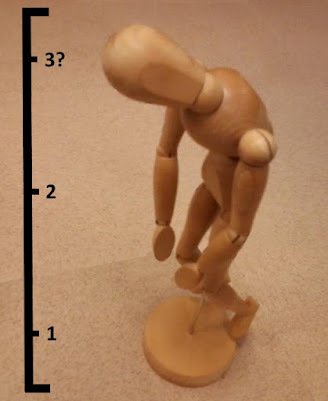 These distinctive times of explosive technological expansion are ushering in a "new epoch" in human history in which humans have access to unprecedented levels of material power, and must grapple with the bewildering scope of possibilities and dangers entailed by that power. Among other things, the epoch of power poses dramatic challenges for politics — it gives humanity the "tools" to construct human (or inhuman) societies which immerse and involve their members on a larger scale than anything we have seen or imagined before.
These distinctive times of explosive technological expansion are ushering in a "new epoch" in human history in which humans have access to unprecedented levels of material power, and must grapple with the bewildering scope of possibilities and dangers entailed by that power. Among other things, the epoch of power poses dramatic challenges for politics — it gives humanity the "tools" to construct human (or inhuman) societies which immerse and involve their members on a larger scale than anything we have seen or imagined before.Historically, we have seen the destructive nature of particular important-but-limited communities that take on an "absolute" definitive status for their members. The result resembles a kind of idolatry — a kind of "divinization" of an ideology or a system, or of a nation, race, ethnic group, or tribe. And we see now the rise of "new tribes" not connected by kinship, but defined by what (or whom) they exclude, and by the pseudo-identities they generate through the images of electronic media, simplistic slogans, superficial "rituals," and other propaganda techniques that are accessible to everyone in this new epoch.
A new kind of idolatry is casting a shadow over our times. It exists in full realization in some places in the world, while in others it lurks as a tendency, as the possible future of present unhealthy aspirations, as an inchoate or partial reality, as a danger, and — undoubtedly — as a temptation. This is not the old "hard" religiously-specified pagan idolatry of worshiping statues or personified forces of nature. It is the much more subtle new "soft idolatry" that marginalizes and effectively replaces God — the One who alone fulfills the transcendent destiny of the human person — with a merely human social or political project.
In recent years (and in recent weeks), government policies in the United States - and the unceasing barrage of words accompanying them on all the media platforms - illustrate the dangers that are spreading all over the world. The problem is not expanding or reducing the size of political institutions, but the role of political power in shaping the human person's understanding of his or herself. Sometimes power pushes against human dignity by promoting a vast social ideal that falsifies the genuine aspirations of human beings as persons (for example, the ideal of "Socialism-with-Chinese-Characteristics-in-a-'moderately-prosperous'-Society" as imposed on one-fifth of the world's population by Xi Jinping and the Chinese Communist Party). Other times, different impositions of power aim to reduce human persons into partisans of a particular "tribe," a self-sufficient, self-exalting, selfish national or ethnolinguistic group with a "manifest destiny" to "greatness," which generally reduces itself to pretentions to become the greatest commercial empire obsessed with materialist consumerism and isolated by the fear of real or imagined "enemies" in the rest of the world.
Both of these extremes, and the various tendencies that borrow from them, are "idolatrous." They tether the human spirit to their paltry materialistic horizons (and they are not afraid to co-opt "God" in a reductionist sense, in service of their projects). Simply, one might categorize this whole phenomenon as "the idolatry of money." More broadly, it is the idolatry that emerges from covetousness and envy, with all the belligerency and chaos that these idols can unleash especially when they disguise themselves as political programs or social movements.
This new idolatry is subtle because its gradual but ultimately totalizing absorption of the human person spreads covertly within society like an incubating disease. It builds itself up through diverse inflammatory manifestations of social problems that often seem to contradict each other. It grows within societies when there is widespread insecurity about personal identity, weak interpersonal and communal bonds, rival ideologies, various artificially aggravated fears, rumors and confusion, negligent ignorance, cultivated superficiality, lack of civil discourse, lack of principles, reliance on pseudo-"authorities" and magnetic or manipulative personalities, pressure for cultural conformity, revenge, group-think, nostalgia, utopian dreams, excessive hopes for prosperity, for progress, for total safety from danger, for many other things (the list could go on and on) ... and — of course — the increasing (and always justified as "necessary") application of good old fashioned brute force.
It all conspires to eclipse the transcendence of human destiny, suffocate the heart of the human person, and preoccupy people with a multitude of distractions. It infects the politics of our time, which in various ways pretends in a practical sense (or sometimes pretends — which is already too much) to rule over all our thinking about the meaning of things, to fill our minds with its claim to be the highest measure of life.
The political ideal of the new epoch is idolatrous insofar as it aspires (even without the awareness of all who participate in it) to "deflect" the human search for transcendence and invade its space, or to use power to suppress it and take its place. It is accompanied (and "enabled") by the reduction of the scope of human desire to the empirical categories of objects-to-be-possessed, and the prevalence of practical materialism as the social norm.
In terms of depth and danger, these emerging forms of political idolatry are venturing into "uncharted territory." Politics now has at its disposal the continuing explosive growth of material power for everything from making things to processing and distributing information to bridging distances and gaining unprecedented dominance over space and time to enhanced forms of multi-sensory engagement through media technology and the (gigantically expansive) realm of so-called "artificial intelligence."
What are the monstrous political possibilities that might emerge in the future, perhaps even the near future? Will we have the awareness and attention necessary to recognize them and the courage to resist capitulating to them?
February 3, 2025
Love of Money
This text may sound prosaic, but there is much in these few words that we all need to ponder — especially those of us who live in the richest society (by far!) in the history of humanity: "Let your life be free from love of money" (Hebrews 13:5).

January 31, 2025
Saint John Paul II and the Dignity of Immigrants
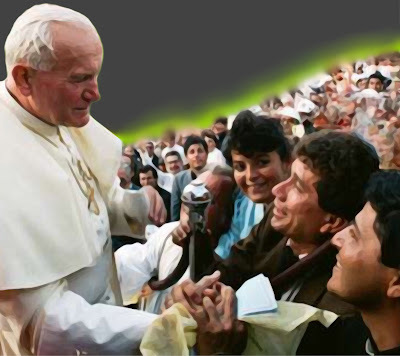 Here are some excerpts from Pope Saint John Paul II’s “Message for World Migration Day,” November 21, 1999. He made it clear (as did his predecessors) that the dignity of immigrants is entailed by the dignity of every human person, created in the image of God, redeemed by the love of Jesus Christ. We who have been so greatly blest with an abundance of the goods of this world cannot close our hearts to immigrants in need. Through them, Jesus is calling us to conversion, fraternity, solidarity, and hospitality today just as He was 25 years ago.
Here are some excerpts from Pope Saint John Paul II’s “Message for World Migration Day,” November 21, 1999. He made it clear (as did his predecessors) that the dignity of immigrants is entailed by the dignity of every human person, created in the image of God, redeemed by the love of Jesus Christ. We who have been so greatly blest with an abundance of the goods of this world cannot close our hearts to immigrants in need. Through them, Jesus is calling us to conversion, fraternity, solidarity, and hospitality today just as He was 25 years ago.
On the threshold of the new millennium, humanity is marked by phenomena of intense mobility, while the awareness of being members of one family continues to grow in people's minds. Voluntary or forced migration increases opportunities for exchange among people of different cultures, religions, races and nationalities. Modern means of transport are ever more rapidly connecting one part of the globe to another, and every day borders are crossed by thousands of migrants, refugees, nomads and tourists.
The immediate reasons for the complex reality of human migration differ widely; its ultimate source, however, is the longing for a transcendent horizon of justice, freedom and peace. In short, it testifies to an anxiety which, however indirectly, refers to God, in whom alone man can find the full satisfaction of all his expectations.
Many countries make a considerable effort to welcome immigrants, many of whom, after overcoming the difficulties of adjustment, are well integrated into the host community. However, the misunderstandings that foreigners sometimes experience show the urgent need for a transformation of structures and a change of mentality….
In many regions of the world today people live in tragic situations of instability and uncertainty. It does not come as a surprise that in such contexts the poor and the destitute make plans to escape, to seek a new land that can offer them bread, dignity and peace. This is the migration of the desperate: men and women, often young, who have no alternative than to leave their own country to venture into the unknown. Every day thousands of people take even critical risks in their attempts to escape from a life with no future. Unfortunately, the reality they find in host nations is frequently a source of further disappointment.
At the same time, States with a relative abundance tend to tighten their borders under pressure from a public opinion disturbed by the. inconveniences that accompany the phenomenon of immigration. Society finds itself having to deal with the "clandestine", men and women in illegal situations, without any rights in a country that refuses to welcome them, victims of organized crime or of unscrupulous entrepreneurs….
The Church, Mother and Teacher, works so that every person's dignity is respected, the immigrant is welcomed as a brother or sister, and all humanity forms a united family which knows how to appreciate with discernment the different cultures which comprise it. In Jesus, God came seeking human hospitality. This is why he makes the willingness to welcome others in love a characteristic virtue of believers. He chose to be born into a family that found no lodging in Bethlehem (cf. Lk 2:7) and experienced exile in Egypt (cf. Mt 2:14). Jesus, who "had nowhere to lay his head" (Mt 8:20), asked those he met for hospitality. To Zacchaeus he said: "I must stay at your house today" (Lk 19:5). He even compared himself to a foreigner in need of shelter: "I was a stranger and you welcomed me" (Mt 25:35). In sending his disciples out on mission, Jesus makes the hospitality they will enjoy an act that concerns him personally: "He who receives you receives me, and he who receives me receives him who sent me" (Mt 10:40)….
In the context of a human mobility that has expanded everywhere, [Christ’s] invitation to hospitality becomes timely and urgent. How can the baptized claim to welcome Christ if they close the door to the foreigner who comes knocking? "If anyone has the world's goods and sees his brother in need, yet closes his heart against him, how does God's love abide in him?" (1 Jn 3:17).
The Son of God became man to reach out to all, giving preference to the least ones, the outcast, the stranger…. The Church hears the suffering cry of all who are uprooted from their own land, of families forcefully separated, of those who, in the rapid changes of our day, are unable to find a stable home anywhere. She senses the anguish of those without rights, without any security, at the mercy of every kind of exploitation, and she supports them in their unhappiness.
In all the societies of the world the figure of the exile, the refugee, the deportee, the clandestine, the migrant and the "street people" … for believers becomes a call to change their mentality and their life, in accordance with Christ's appeal: "Repent, and believe in the Gospel" (Mk 1:15).
In its highest and most demanding motivation, this call to conversion certainly includes the effective recognition of the rights of migrants: "It is urgent in their regard that one know how to overcome a strictly nationalistic attitude to create a State which recognizes their right to emigration and encourages their integration.... It is the duty of all—and especially Christians—to work energetically to establish the universal brotherhood which is the indispensable basis of true justice and a condition for lasting peace" (Paul VI, Encyclical Octogesima Adveniens, n. 17).
Working for the unity of the human family means being committed to the rejection of all discrimination based on race, culture or religion as contrary to God's plan. It means bearing witness to a fraternal life based on the Gospel, which respects cultural differences and is open to sincere and trustful dialogue. It includes the advancement of everyone's right to be able to live peacefully in his own country, as well as attentive concern that in every State immigration laws be based on the recognition of fundamental human rights.
January 30, 2025
“The Lord Protects Strangers”
January 28, 2025
St Thomas Aquinas and the Act of Be-ing
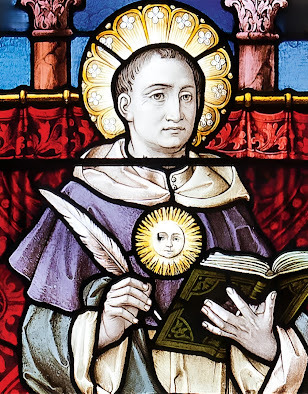 For the feast of St Thomas Aquinas, I am posting an excerpt from my book The Created Person and the Mystery of God, published a long long time ago (in 2003). This selection introduces Thomas's great insight into the real distinction between essence and existence. It is only a sketch of the argument within the context of a larger presentation, but it might serve as a reminder of why St Thomas is so important not only as a Doctor of the Church but also as a philosopher who makes a monumental contribution to human understanding.
For the feast of St Thomas Aquinas, I am posting an excerpt from my book The Created Person and the Mystery of God, published a long long time ago (in 2003). This selection introduces Thomas's great insight into the real distinction between essence and existence. It is only a sketch of the argument within the context of a larger presentation, but it might serve as a reminder of why St Thomas is so important not only as a Doctor of the Church but also as a philosopher who makes a monumental contribution to human understanding.What follows is the excerpt from my 2003 book (which is still available for purchase - open THIS LINK if you're interested). Happy Feast of St Thomas!
In a small early treatise entitled De Ente et Essentia, St Thomas proposes an argument for the existence of God which takes as its starting point not the various activities and characteristics of created things, but their most fundamental "activity" - their very act of existing. In chapter five of De Ente et Essentia, Thomas argues that, with regard to all of the things that we encounter, "what they are" cannot explain the fact that they actually do exist in reality. Therefore their existence must be explained in terms of Something Else; it must be caused by Something Else.
The main principle that St Thomas develops in this little treatise is that there is a real distinction between essence and existence, between the essentially integrated complexus of specifications that define what something is, and the actualization of that specificity, the "placing" of it into the real universe of existence.
The existing of something - its esse (to use the Latin infinitive for the verb "to be"), the act by which it "is" - is distinct from "what it is," its essence. Existing introduces another dimension beyond everything we can say about what a thing is. When I say "the horse exists," I take the whole richly envisioned description of "horse" that I an able to apprehend and examine with my mind, and I affirm "something else" with regard to the horse, something that is not part of the description of a horse; I judge an instance of this essence (the "whatness" of horse, "horseness") to be there in reality. The horse is. The horse is existing.
Notice something very important here: existing is an act. It is the most fundamental of all acts. To exist is dynamic, radically dynamic. The reason why we think of existing as static is because we are surrounded by it everywhere and therefore inclined to ignore it or regard it as commonplace. But things are not just plopped around us - just "there," with this fact worthy of nothing more than a "ho-hum" from our faculties of perception. On the contrary, things are bursting with being. "Is-ing" is a fascinating and powerful achievement - the achievement of really existing which should never be taken for granted, as something that does not provoke our minds to wonder (American philosopher Frederick Wilhelmsen was known for his vigorous presentation of this point in his famous "is-ing" lecture).
We have allowed ourselves to be lulled into metaphysical sleep by the apparently commonplace character of the existence of things. We must realize, instead, that the existing of any thing is a spectacular and awe-inspiring event.
This realization, achieved by means of a sufficiently intense attention to the reality of things, will lead us to recognize that existing is an actualization that comes to an essence "from outside." It is at one and the same time the fundamental act that any thing "does," and an act that does not emerge from a thing's own essential power, and which therefore must be brought about in it by Something Else. When we say "John runs," we recognize that "running" is an activity distinct from "John," something that John does; John "actualized" in a certain respect, John moving from one place to another. However, this act takes place as a result of John's own inherent capacities: he causes himself to run by means of the muscular energy he possesses by virtue of the organic and "animal" characteristics that are proper features of his essence.
When we say "John exists," however, we are talking about the fundamental actualization of John, Could John be the cause of his own existence? It's impossible. In order to bring about an effect, a cause has to "be there," but John without the act of existing is not "there," and therefore he cannot bring about any effect at all, much less his own existence.
So how is it, then, that John exercises the act of existing? He must receive the impetus of this act from some outside source. At this point in the argument, St. Thomas invokes the principle that there cannot be an infinite series of caused causes, and thus concludes that there must be a First Cause that gives to all other things their act of existing. As First Cause, it is the Origin of all existence, which means that it does not receive its act of existing from anywhere else. It possesses "existing" properly, as the very definition of what it is. Its essence is "to exist; it is Sheer Existence, the subsistent, pure act of "to be." This Being, indeed, is the Being we call God.
To summarize the argument in simple terms: Our existence does not come from ourselves; it is given to us. This means that there must be a Giver of existence who is the Source of this gift, who therefore possesses it essentially and fully. We have existence because we receive it from the One who is Existence - Pure and Absolute Existence.
January 26, 2025
“Rejoicing in the Lord”
A presentation from the “digital scriptorium” — it’s odd, perhaps, but I have been fiddling with it at different points throughout the day, and now it’s time to say okay, enough! It’s a great verse, in any case…





